Loch an Eilein
Loch an Eilein is a small irregular shaped, freshwater loch in the Rothiemurchus Forest about 5 km (3.1 mi) south of Aviemore, Scotland in Cairngorms National Park. Loch an Eilein comes from the Scottish Gaelic and means 'Loch of the island'.[4] The loch is considered to be beautiful[5] and walks around it are popular.[6]
| Loch an Eilein | |
|---|---|
 | |
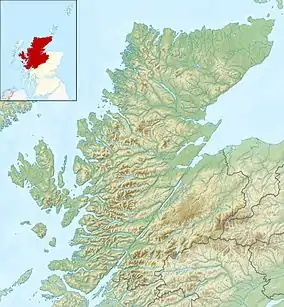 Loch an Eilein | |
| Location | Badenoch and Strathspey, Scotland |
| Coordinates | 57°08′49″N 3°49′27″W[1] |
| Type | freshwater loch |
| Primary outflows | Milton Burn |
| Basin countries | United Kingdom |
| Max. length | > 1 mi (1.6 km)[2] |
| Max. width | < 0.5 mi (0.80 km)[2] |
| Surface area | 56.1 ha (139 acres)[1] |
| Average depth | 25.5 ft (7.8 m)[2] |
| Max. depth | 66 ft (20 m)[2] |
| Water volume | 144,000,000 cu ft (4,100,000 m3)[2] |
| Surface elevation | 256 m (840 ft)[1] |
| Islands | 1 island with ruined castle[3] |
History of usage
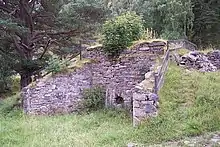
In the late 18th and early 19th century, the loch was used mainly for two things. On the banks of the loch there is a limestone kiln where the limestone was collected from a rockface looking over the loch. Also loggers used the connecting river to float logs down to the wood-treating factories downstream. Rob Roy and other cattle rustlers used the loch, and one side of the loch is called 'Robbers Way'. There are only three remaining houses on the loch. One of the former farm sites is now being used as the location for the Loch an Eilein Gallery.[7]
Loch an Eilein castle
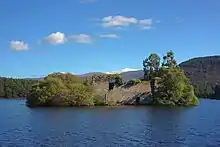
In the middle of the Loch, on what may be a natural island, are the ruins of a small 14th century castle.[3][8] It was originally constructed as a place of refuge from thieves and threatening activities.[9] The castle is said to have once been the property of Alexander Stewart the Wolf of Badenoch.[10]
The castle was the site of conflict. The Jacobites, retreating from Cromdale in 1690, besieged the castle. Dame Grizel Mor Grant, widow of the fifth laird Grant, held the castle against the Jacobites.[9] The castle fell out of use in the late 18th century.[9]
The castle may have originally been connected to the shore by a causeway.[9] The causeway became submerged when the water level in the loch was raised by estate work and the building of a dam in the 18th century.[4][8] The castle was used as the site of the island graveyard in BBC TV’s ‘Monarch of the Glen’.
About the park
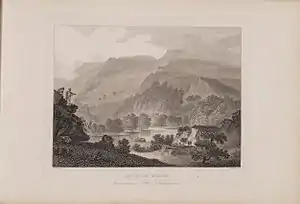
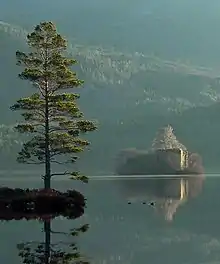
Located in Cairngorms National Park, the loch and the forest around it are popular with birdwatchers, walkers, mountain bikers and day-trippers.[11] Among the birds found on or around Loch an Eilein are the crested tit, redstart, spotted flycatcher, tree pipit, red-throated diver, common sandpiper, whinchat, and the occasional merlin. The Loch has been voted on the UK's best picnic spot.[4] The Loch an Eilein park has numerous facilities, including washrooms, visitor centre, and a car park.[4] It is notable for its accessibility due to the flat and even nature of the five kilometre trail which loops around the loch.[12]
References
- "Loch an Eilein". www.britishlakes.info. Retrieved 2013-11-17.
- "Bathymetrical Survey of the Fresh-Water Lochs of Scotland, 1897-1909, Lochs of the Spey Basin". National Library of Scotland. Retrieved 2016-12-28.
- "Loch-an-eilein Castle". Gazetteer of Scotland. Retrieved 2013-11-17.
- "The Lochs of the Cairngorms National Park". Cairngorms National Park. 2015-11-19. Retrieved 2019-06-22.
- "Loch-an-eilein voted Britain's best picnic spot". www.rothiemurchus.net. Archived from the original on 2013-11-27. Retrieved 2013-11-17.
- "Loch an Eilein, Rothiemurchus". www.walkhighlands.co.uk. Retrieved 2013-11-17.
- "Eat, Drink, Shop Detail | Visit Cairngorms". visitcairngorms.com. Retrieved 2019-06-22.
- "Loch An Eilein". Rothiemurchus. Retrieved 2019-06-22.
- "The Lochs of the Cairngorms National Park". Cairngorms National Park. 2015-11-19. Retrieved 2019-06-22.
- "Eilein, Loch an". www.scottish-places.info. Retrieved 2013-11-17.
- "Activity Detail | Visit Cairngorms". visitcairngorms.com. Retrieved 2019-06-22.
- "Loch an Eilein and Creag Dubh: Top 5 Walking Routes in the Cairngorms". Wilderness Scotland. 2015-09-21. Retrieved 2019-06-22.
